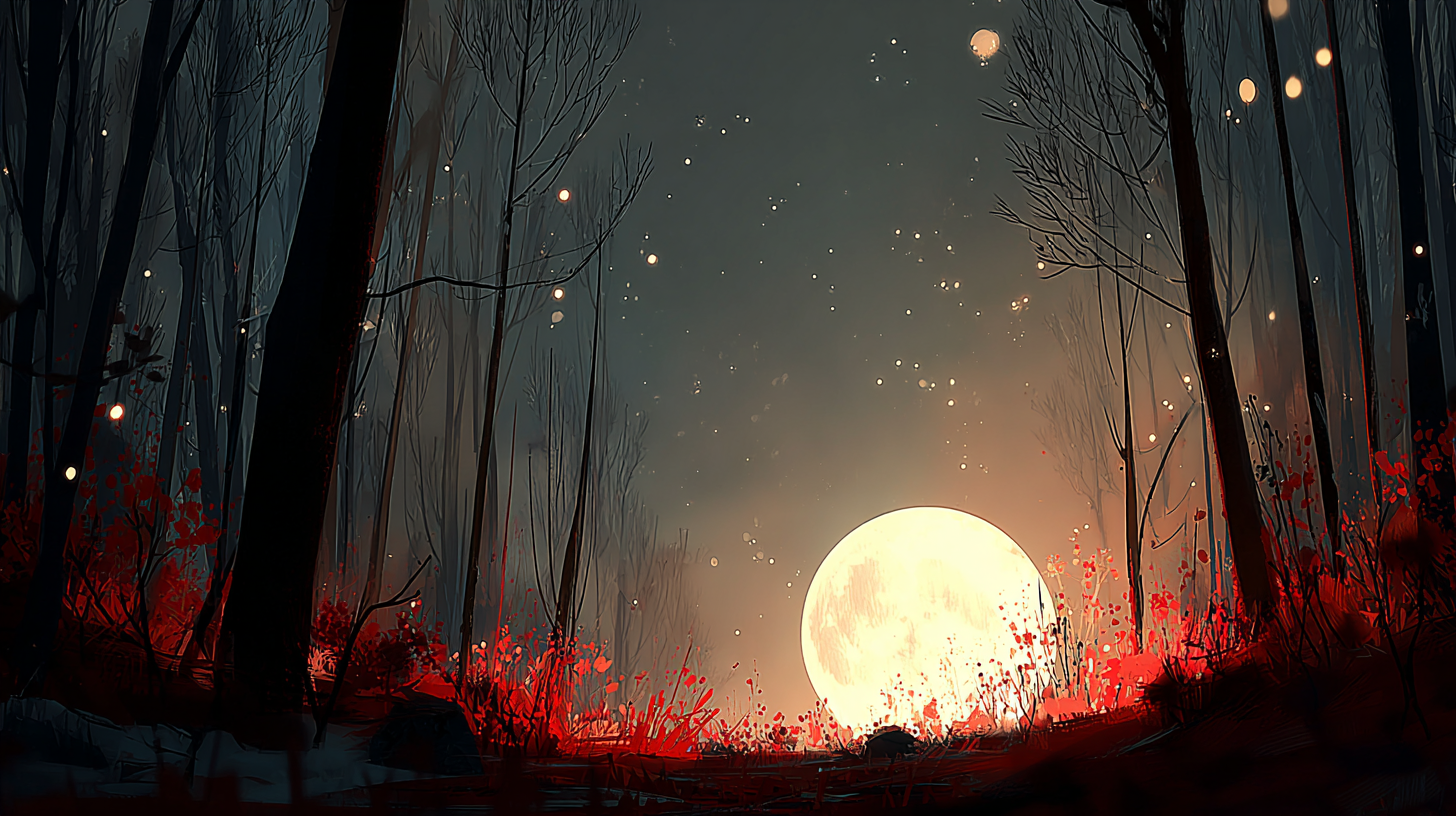Moon means “the bright round object in the night sky” and sometimes “to joke in a silly way.”
moon は「夜空に見える月」のこと。動詞ではスラングで「からかう」意味もある。
以下は英単語 “” に関するストーリー型学習コンテンツです。まずは大枠の意味を理解して最後の文章で確認しましょう。
主な意味(main meaning)
| 品詞 | 意味 | 発音記号 | 例文 |
|---|---|---|---|
| 名詞 | 月 | /muːn/ | The moon looks bright tonight. |
| 動詞 | からかう(くだけた表現) | /muːn/ | The boys mooned their friend as a joke. |
語源(etymology)
古英語 mōna から来ており、ゲルマン語系の語。もともと「測るもの」という意味があり、月の満ち欠けが時間や月日を測る基準になっていた。イメージは「夜を照らす自然の時計」。
類義語(synonyms)
| 類義語 | 意味 | 例文 |
|---|---|---|
| satellite | 衛星 | The Earth has one natural satellite, the moon. |
| orb | 球体(文学的に月を指す) | The silver orb rose above the trees. |
| lunar body | 月の天体 | Astronomers study the lunar body carefully. |
| crescent | 三日月 | The crescent shone softly in the sky. |
反義語(antonyms)
| 反義語 | 意味 | 例文 |
|---|---|---|
| sun | 太陽 | The sun shines during the day, and the moon shines at night. |
| darkness | 闇 | The moon broke the darkness with its light. |
コロケーション(collocations)
| コロケーション | 例文 |
|---|---|
| full moon | We went camping under a full moon. |
| new moon | A new moon is hard to see in the sky. |
| moonlight | The couple walked in the moonlight. |
| moon surface | Scientists landed on the moon surface. |
| harvest moon | The harvest moon appeared in autumn. |
2項表現(binomials)
| 2項表現 | 例文 |
|---|---|
| sun and moon | People have always admired the sun and moon. |
| day and night | The moon and stars can be seen day and night. |
英語ストーリー(english story)
Last summer, I worked at a small observatory in my town. Every night, I had to welcome visitors who came to see the moon and the stars. One evening, a family came with their little son. He looked very excited because it was a full moon. His father told him, “The Earth has one natural satellite, the moon.” The boy asked me if the moon surface was smooth. I explained, “No, it has many mountains and holes, which we call craters.”
Later, another visitor asked me about the difference between the sun and moon. I said, “The sun gives us heat and light during the day, while the moon shines at night by reflecting the sun’s light. So, even in the darkness, the moonlight helps us see.” The visitor nodded with interest.
When the evening ended, my coworker joked with me by saying, “We have to work day and night like the moon and sun.” We both laughed. On our way home, we looked up at the crescent above the trees. It was beautiful, like a silver orb floating in the sky. My coworker said, “Tonight looks like a perfect night for a walk under the harvest moon.” And so, we decided to enjoy the quiet evening together.
和訳
去年の夏、私は町の小さな天文台で働いていました。毎晩、moon(月)や星を見に来る人たちを迎えるのが仕事でした。ある夜、ある家族が小さな男の子を連れてやってきました。彼はとてもワクワクしていて、その日はfull moon(満月)でした。父親は「地球には1つの自然のsatellite(衛星)、つまり**moon(月)**があるんだよ」と教えていました。男の子は私に「**moon surface(月の表面)**はなめらかですか?」と聞きました。私は「いいえ、たくさんの山や穴があって、それをクレーターと呼ぶんです」と説明しました。
その後、別のお客さんが「**sun(太陽)とmoon(月)**の違いは何ですか?」と質問しました。私は「**sun(太陽)**は昼に熱と光を与えますが、**moon(月)は太陽の光を反射して夜に輝きます。だからdarkness(闇)の中でもmoonlight(月明かり)**が私たちを照らしてくれるんです」と答えました。お客さんは興味深そうにうなずきました。
夜が終わったころ、同僚が「私たちは**day and night(昼も夜も)働かなきゃいけない、まるでmoon(月)とsun(太陽)みたいだね」と冗談を言いました。私たちは笑いました。帰り道、木の上に浮かぶcrescent(三日月)を見ました。それは空に浮かぶ銀色のorb(球体)のように美しかったです。同僚は「今夜はharvest moon(名月)**の下で散歩するのにぴったりだね」と言いました。そこで私たちは静かな夜を楽しむことにしました。
Q&A
Q: 「moon」と「satellite」の違いは何ですか?
A: 「moon」は地球の月を指す固有の名前です。一方「satellite」は「衛星」という一般的な言葉で、地球の月だけでなく、他の惑星の衛星や人工衛星も含みます。
Q: 「moon」と「orb」の違いは何ですか?
A: 「orb」は「球体」という文学的で詩的な表現で、月や太陽を美しく表すときに使われます。「moon」は科学的・日常的に「月」と呼ぶ普通の言葉です。
Q: 「moon」と「lunar body」の違いは何ですか?
A: 「lunar body」は「月の天体」という学術的・専門的な表現で、天文学の説明で使われます。「moon」はもっと一般的で日常的に使われる言葉です。
Q: 「moon」と「crescent」の違いは何ですか?
A: 「moon」は月全体を指す言葉ですが、「crescent」は月の形が「三日月」のときだけを指します。つまり「crescent」は「moon」の一部の状態を表す言葉です。
Q: 「moon」と「sun」の違いは何ですか?
A: 「moon」は地球の衛星で、太陽の光を反射して夜に光ります。「sun」は恒星で、自ら光と熱を出して地球を照らしています。
Q: 「moon」と「darkness」の違いは何ですか?
A: 「darkness」は「暗闇」という状態を指します。「moon」はその暗闇を明るくする存在です。つまり「moon」は「darkness」をやわらげる役割を持っています。
Q: 「full moon」と「new moon」の違いは何ですか?
A: 「full moon」は月が丸く完全に見える満月です。「new moon」は地球からはほとんど見えない新月の状態を指します。
Q: 「moonlight」と「sunlight」の違いは何ですか?
A: 「moonlight」は月から届く光で、実際は太陽の光の反射です。「sunlight」は太陽そのものから届く直接の光です。
Q: 「moon surface」と「moonlight」の違いは何ですか?
A: 「moon surface」は「月の表面」を物理的に指します。一方「moonlight」は「月の光」を意味し、目に見える明るさを表します。
Q: 「harvest moon」と「full moon」の違いは何ですか?
A: 「harvest moon」は秋分に一番近い満月のことを特別に呼ぶ言葉です。「full moon」は毎月訪れる満月全般を指します。
このように整理すると、moon が一番基本的で日常的な表現であり、他の類義語やコロケーションは「専門的」「文学的」「状態を限定する」などのニュアンスがあるとわかります。



コメント